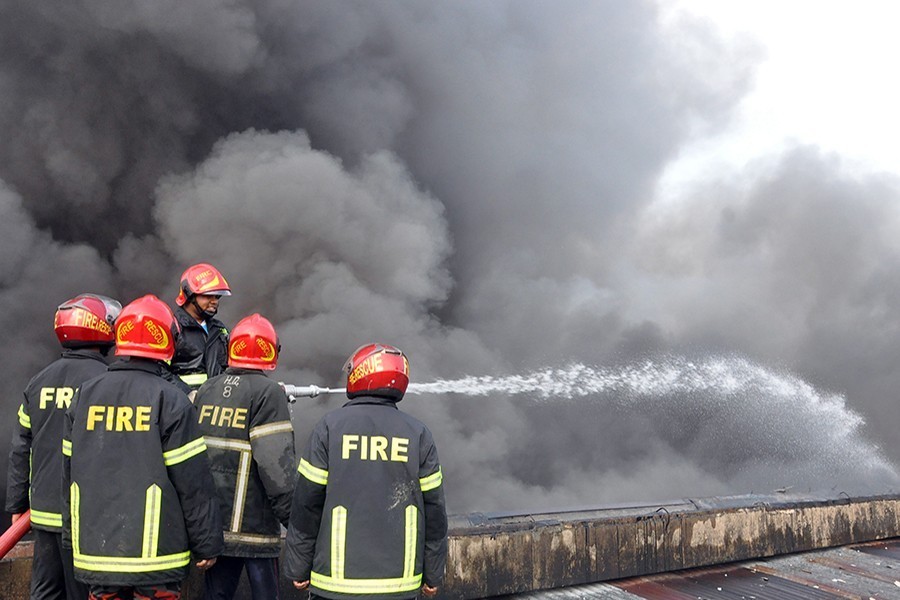The number of fire incidents in Bangladesh has increased four times over the last two decades as the country's urban areas are expanding without basic infrastructure like fire stations.
According to data provided by the Fire Service and Civil Defence, around 285,000 fires occurred in the country between January 1, 1999, and December 31, 2020.
These fire incidents also caused an estimated financial loss of around Tk 69 billion to the nation.
Besides, at least 2,308 people were killed in fires across the country between 2004 and 2020, the fire service data shows.
The year 2019 saw the highest number of 24,074 fire incidents while 2020 the second highest of 21,073.
Urban experts attributed the rise in fire incidents to unplanned urbanization, the violation of rules for constructing buildings, a pervasive culture of non-enforcement of the law, carelessness of people, increased use of gas cylinders and different electronic devices and lack of supervision by the authorities concerned.
They also said people in the capital and other major cities of the country are at a high risk of fires due to a lack of proper urban fire safety systems.
The experts suggested taking immediate initiatives to ensure safety compliance of city buildings like the garment factories and raising public awareness to significantly reduce the number of fires.
Three major causes
As per the statistics of the Fire Service and Civil Defence, around 99,752 fires occurred in the country between January 1, 2016 and December 31, 2020.
Of them, 71,684 or over 71 per cent of fires originated from electric disturbances, different types of burners and burning cigarettes in the last five years.
Of the total incidents, 37,044 (37 per cent) originated from electric disturbances while 19,124 (19.17 per cent) from different types of burners and 15,536 (15.57 per cent) from burning cigarettes.
Contacted, Prof Mehedi Ahmed Ansari of the Civil Engineering department at Bangladesh University of Engineering and Technology (BUET) said electric short-circuit is the main reason behind the rise in fire incidents in urban areas as most buildings are not constructed maintaining the building code.
He said other reasons for the fire are associated with people's lack of awareness. "An effective campaign to raise public awareness in this regard should be launched across the country."
The expert said electric equipment should be inspected periodically to reduce the chances of fire.
Enforcing building code
Prof Ansari said they conducted a study a few years back and found most high-rises in Dhaka and other cities without fire safety measures as those were constructed flouting the building code.
He said there are more than 3,000 high-rises in Dhaka city alone. "These buildings should be immediately inspected to ensure fire safety."
The BUET professor said the recent statistics suggest fire incidents in garment factories have declined sharply as pressure from foreign buyers after the Rana Plaza tragedy led to safety improvement at most buildings housing such factories.
"But quality fire safety is not being ensured in other offices, factories and residential houses--both in high-rise and low-rise ones. So, the government should strictly enforce the building code to ensure urban fire safety," he said.
He also recommended keeping fire extinguishers on every floor and training people on their use in the case of any fire incident. "We see many owners keep the main gates and the doors of the rooftop of their houses locked. In this case, the owners must provide each tenant with the keys of the locks."
Engaging private organisation
In the updated building code, Ansari said all the necessary directions have been mentioned about how to construct a safe building and ensure fire safety. "But the problem is its poor implementation. Rajuk is supposed to implement the building code, but it lacks adequate and quality manpower."
Ansari said fire safety measures are ensured at garment factories as per the Accord and Alliance, the two western buyers' platforms, created huge pressure on the factory owners to ensure safety and compliance after the Rana Plaza tragedy in 2013.
"That's why we've long been suggesting the government to assign a private organisation to work for ensuring fire-safety in the existing buildings and implement the building code in constructing new ones," he said.
The expert said no government body deals with fire safety issues in most of the countries in the world. "Private companies are given the responsibility and the government only monitors it. The company will be liable in the case of any negligence in ensuring fire safety in any building it supervises."
Including fire safety issue in textbooks
Abdul Momen, Assistant Director (training) of Fire Service and Civil Defence Directorate, said trained volunteers are needed alongside building awareness among people to check the fire incidents.
He said the government can take a programme with the help of NGOs to create trained manpower in major cities and fire-prone districts. "In many cases when a fire originates in any house, the inmates escape it out of fear instead of trying to douse the blaze initially. In this case, trained volunteers can take the initial step to put out the fire before reaching the firefighters."
Besides, he said, it is necessary to include the lessons on fire safety issues in the national curricula so that students can learn about the reasons for fire and fire extinguishing systems.
The National Curriculum and Textbook Board (NCTB) can take steps to include a chapter on fire issues in the textbooks from class VI to Class X. "Every individual should know how to protect him/her in case of fire. Children in different countries are given a lesson on it. Many fires can be controlled at an early stage if people know how to do it."


